
Let’s get one thing clear: the “Official Nintendo Seal of Quality” is about as meaningful as a degree from Columbus University. In the Famicom/Nintendo Entertainment System days the Seal meant simply that a game’s developer had paid their dues to Nintendo to manufacture their cartridges. As a distinction, it did not improve with time.
Plenty of studios didn’t even bother with that formality, most notably Atari Games spin-off Tengen, who actually obtained the blueprints for the Famicom’s 10NES lock-out chip from the US Copyright Office under the pretext of preparing for a lawsuit and used it to reverse-engineer a workaround that would allow their unlicensed games to work on the NES. Christian developers Wisdom Tree also released several notoriously awful unlicensed games for the Famicom.
The Nintendo Seal of Quality was even worse than a licensing formality. It was a dirty lie, because not only did it not mean that Nintendo had vetted a game’s, y’know, “quality” – Nintendo actively made games bearing that sticker worse by censoring them for US release, limiting their production runs, and forcing third-party developers into exclusive deals, thus crippling competition from the Sega Master System and others.
All of which brings us to this week’s Emulation Nation Random Game of the Week, a new feature in which I fire up my MAME cabinet (which actually also includes just about every pre-CD-ROM era console game) and talk about the first turd whose stench reaches my nose.
Considering that Sturgeon’s Law is particularly applicable to videogames, I’m not sure what I’m getting myself into here. It’s like a game of Russian Roulette where five chambers are loaded. This week’s game is Wall Street Kid, a 1990 non-classic by developer Sofel. Tellingly, the game’s box bears the aforementioned “Official Nintendo Seal of Quality.” Seanbaby‘s already done this one on his site, calling it “one of the 10 worst things to make a game about,” but the wheel has spoken.
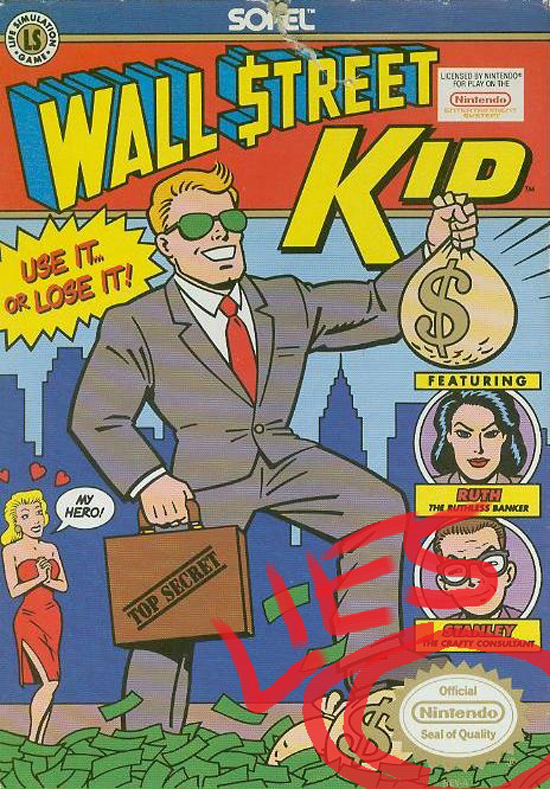
Wall Street Kid starts off with this nail-biting premise…

…and the action never lets up from there.
Now, you might be thinking that a game called Wall Street Kid might take place on the madhouse trading floor of the New York Stock Exchange. Perhaps they’ve made it into yet another NES platformer where you’ll have to dodge flying briefcases and chattering staplers to reach your broker before closing time. No such luck. The game immediately dumps you into a chair at a desk where the entirety of the game takes place.
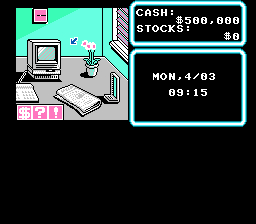
Screw escapism, this game wanted to introduce kids early to their soul-crushing futures as office drones. Using the NES controller as a mouse pointer – always a fun control method – you “play” the game by clicking on various objects around your desk. Selecting your computer takes you to the option to buy and sell stocks in various barely-concealed real-life companies like Reebucks and Rattel Toys.
I can’t tell you how excited I would’ve been to play this game at ten years old, fuck you Super Mario Bros. 3.
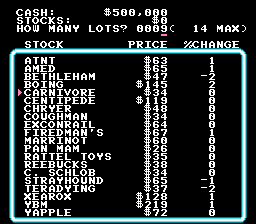
Clicking on a flower pot gives you various “romance” options like “Carnival” or “Shopping.” I chose “Picnic.”
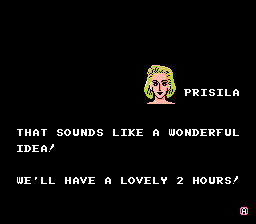
Two hours? I think “Prisila” is about to be disappointed.
Anyway, after our picnic, I killed another four hours of game time at the gym, somehow. Then, I read the paper.
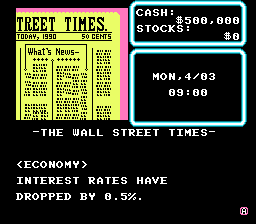
Apparently, you can eventually win Wall Street Kid by accomplishing various chores culminating with winning an auction for your uncle’s castle, but I couldn’t take another minute of this so-called game and it’s chirpy, 30-second soundtrack loop. In true Wall Street style, I clicked on the window.
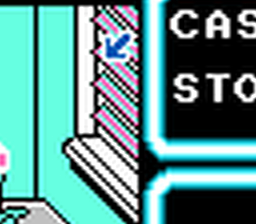
Like old school videogames and emulators? Join Suicidegirls today and come talk about it in our Emulation Nation discussion group.


[…] week in my post about Wall Street Kid, I mentioned that Sturgeon’s Law might be especially true for video games. Coined by the […]